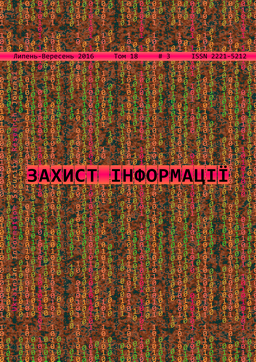Experimental research of efficiency increasing method for qutrits quantum cryptography protocols
DOI:
https://doi.org/10.18372/2410-7840.18.10851Keywords:
quantum cryptography, quantum secure direct communication, trit, information securityAbstract
Today acutely raises the issue of providing information confidentiality in conditions of growth quantity and quality of violations in cyberspace that are constantly improving and developing. Reliability of traditional methods for ensuring confidentiality is questionable taking into account contemporary threats. So look for alternative methods and means of security is urgent issue. Significant interest causes quantum cryptography, which do not depend on computing or other capabilities of offender, uses specific unique properties of quantum particles, and based on the inviolability of the laws of quantum physics. One of the most advanced technology of quantum cryptog-raphy is quantum secure direct communication, which can transmit information directly by open channel (without encryption – in this case there is no key distribution problem), but they have only asymptotic resistance to noncoherent attacks and, certainly requires some methods for amplification security. In this regard, developed a method of ensuring the stability of quantum cryptography protocols. To evaluate the effectiveness of this method was developed a methodology for conducting experimental research, according to which it is made comparing of its performance with known method. According to the obtained results, the proposed method has a speed in 1.52 times faster against analogs at the same level of resistance to noncoherent attacks.References
Василиу Е.В. Безопасные системы передачи конфиденциальной информации на основе протоколов квантовой криптографии : монография / Е.В. Василиу, В.Я. Мильчевич, С.В. Николаенко, А.В. Мильчевич. – Харьков: Цифровая типография № 1, 2013. – 168 с.
Василиу Е.В. Синтез основанной на пинг-понг протоколе квантовой связи безопасной системы прямой передачи сообщений / Е.В. Василиу, С.В. Николаенко // Наукові праці ОНАЗ ім. О.С. Попова. – 2009, № 1. – С. 83-91.
Гнатюк С.О. Метод підвищення захищеності систем захисту інформації на базі квантових технологій / С.О. Гнатюк, Т.О. Жмурко, А.Д. Стояновіч, Н.А. Сєйлова // Стан та удосконалення безпеки інформаційно-комунікаційних систем (SITS’2015) – Миколаїв: 2015. – С. 93-96.
Корченко О.Г. Сучасні квантові технології захисту інформації / О.Г. Корченко, Є.В. Васіліу, С.О. Гнатюк // Захист інформації. – 2010. – № 1. – С. 77–89.
Методы перехвата информации в информационно-коммуникационных системах на основе квантових технологий / А.Г. Корченко, Е.В. Василиу, Т.А. Жмурко, С.А. Гнатюк // Информа-ционные технологии и системы в управлении, образовании, науке: Монография [под. ред. В.С. Пономаренко]. – Харків: Цифрова друкарня № 1, 2013. – C. 98-110.
Новий метод підсилення секретності пінг-понг протоколу з парами переплутаних кутритів / В.М. Кінзерявий, Є.В. Васіліу, С.О. Гнатюк, Т.О. Жмурко// Захист інформації. – 2012. – №2 (55). – С. 5-13.
Vasiliu Ye. Security amplification of the ping-pong protocol with many-qubit Greenberger-Horne-Zeilinger states / Ye. Vasiliu, S. Gnatyuk, S. Nikolayenko, T. Zhmurko// Безпека інформації. – 2012. – Т. 18. – № 2. – С. 84-88.
Gnatyuk S. Efficiency increasing method for quantum secure direct communication protocols / S. Gnatyuk, T. Zhmurko, P. Falat // Proceedings of the 2015 IEEE 8th International Conference on «Intelligent Data Acquisition and Advanced Computing Systems: Technology and Applications» (IDAACS’2015), Warsaw, Poland, September 24-26, 2015: Vol. 1. – P. 468-472.
Korchenko O. Modern quantum technologies of information security against cyber-terrorist attacks / O. Korchenko, Y. Vasiliu, S. Gnatyuk // Aviation. Vilnius : Technika. – 2010. – Vol. 14, Iss. 2. – P. 58-69.
Korchenko O. Quantum Secure Telecommunication Systems / Korchenko O., Vasiliu Ye., Gnatyuk S. et al. // Telecommunications Networks – Current Status and Future Trends (ed. by J.H. Ortiz). – InTech, 2012. – P. 211-236.
Downloads
Published
Issue
Section
License
Authors who publish with this journal agree to the following terms:- Authors retain copyright and grant the journal right of first publication with the work simultaneously licensed under a Creative Commons Attribution License that allows others to share the work with an acknowledgement of the work's authorship and initial publication in this journal.
- Authors are able to enter into separate, additional contractual arrangements for the non-exclusive distribution of the journal's published version of the work (e.g., post it to an institutional repository or publish it in a book), with an acknowledgement of its initial publication in this journal.
- Authors are permitted and encouraged to post their work online (e.g., in institutional repositories or on their website) prior to and during the submission process, as it can lead to productive exchanges, as well as earlier and greater citation of published work (See The Effect of Open Access).

